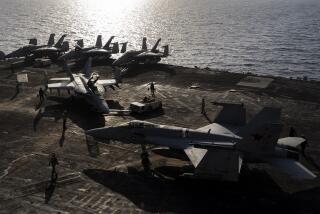3 U.S. Warships to Visit China Port in November
- Share via
PEKING — The United States and China, after more than two years of negotiating, reached final agreement Thursday on a visit by three U.S. Navy ships to the Chinese port of Qingdao next month.
Although the visit will have little military significance, the timing of the announcement, two days before the Iceland summit conference, served to underline the growing ties between Washington and Peking at a time when U.S.-Soviet relations, which had been thawing, are in a state of uncertainty.
The agreement on the warships’ visit, the first in 37 years, was the only publicly announced and tangible result of the visit by Defense Secretary Caspar W. Weinberger. The trip was scheduled primarily to provide a chance for Weinberger to confer with senior Chinese officials rather than to produce specific agreements.
“I am more than ever convinced that our military relationship has a very firm foundation and that the prospects for its future development are bright,” Weinberger said Thursday evening in a banquet toast.
‘Developing Relationship’
He announced the agreement on a naval visit at a news conference at the U.S. Embassy, describing it as “clear evidence of the developing military-to-military relationship” of the two nations, once bitter enemies.
Asked what the visit would mean to the Soviet Union, Weinberger said that U.S.-Chinese cooperation is “not meant to send a signal to anyone.”
Indeed, while a Soviet official here acknowledged that his country is annoyed by Weinberger’s visit, he said it has no particular complaint about the ships’ visit.
However, with the Soviets depending increasingly on their naval base at Cam Ranh Bay, a former U.S. stronghold in Vietnam, and emphasizing in general their Pacific fleet operations, the Qingdao visit will underscore the importance the United States also places on the region--and the fact that it too has friends and interests in Asia.
Under the agreement, three vessels--a cruiser, a destroyer and a frigate now in Sydney, Australia--will visit Qingdao from Nov. 5 to 11. A Chinese official said the ships will bring 894 officers and men to the city.
Site of Naval Academy
Qingdao is both an industrial city and a vacation spot for the Chinese, and it is the home of Tsingtao beer, which is sold in the United States. More significant, perhaps, it is the home of the Chinese naval academy, site of the navy’s northern command and headquarters for the Chinese submarine fleet.
Although the agreement provides for a reciprocal visit by the Chinese navy, it is considered a coastal force, and no plans were announced for Chinese vessels to head for the United States.
The agreement required considerable diplomatic footwork, because China does not allow vessels carrying nuclear weapons to call at ports in this country, and under longstanding U.S. policy, the Pentagon refuses to confirm or deny the presence of nuclear weapons aboard its warships.
Similar conflicts occur in other nations, notably Japan, where authorities simply decline to inquire whether the visiting ships are carrying such armaments.
Conflict Resolved
Weinberger refused to say how the conflict was resolved here, although it appeared that an approach similar to that used in Japan will be followed.
Since early 1985, diplomats have tried nearly every conceivable formula to paper over the nuclear issue, succeeding only in recent weeks.
An agreement on a visit was believed to have been worked out in 1984. But in 1985, Hu Yaobang, general secretary of the Chinese Communist Party, told Australian reporters before a visit to that country that the United States had agreed that Navy warships visiting China would carry no nuclear weapons. The United States said no such assurances were given, and the visit, scheduled for May of 1985, was canceled.
The government-run New China News Agency reported Thursday night that China has not changed its position concerning nuclear weapons.
“China’s consistent policy is not to allow foreign warships carrying nuclear weapons to make port calls to China,” an unnamed Chinese official was quoted as saying.
The earlier visit was to have taken place in Shanghai. With the shift to Qingdao, farther north and closer to the Korean Peninsula, Chinese President Li Xiannian made a hastily scheduled trip to North Korea last week, which Western diplomats believe was intended to reassure officials there.
His Visit Irks Soviets
A Soviet official here acknowledged Thursday that the Soviet Union had been irked by China’s decision to play host to Weinberger this week.
The defense secretary’s visit, and the announcement of the U.S. Navy’s visit, overshadowed a new round of political talks that began Sunday in Peking between China and the Soviet Union. Those talks have not been concluded.
Asked how the Soviet Union felt about the naval visit, the Soviet official replied: “The British, French and Australians have all made port calls to China, so why not the Americans? . . . I suppose it is mostly symbolic, but after all, symbolism too, has political importance.”
Before Communist forces entered Shanghai in May of 1949, the U.S. Navy maintained shipyards there. The American forces pulled out in such haste that they forgot to pay 200 Sikh security guards, who later that year besieged the American Consulate in Shanghai until they received their money.
For two decades, from the Korean War until the beginning of the U.S. rapprochement with China in 1971, the U.S. 7th Fleet patrolled the Taiwan Strait to prevent hostilities between the Communist forces on the mainland and the Nationalists on Taiwan.
More to Read
Sign up for Essential California
The most important California stories and recommendations in your inbox every morning.
You may occasionally receive promotional content from the Los Angeles Times.













